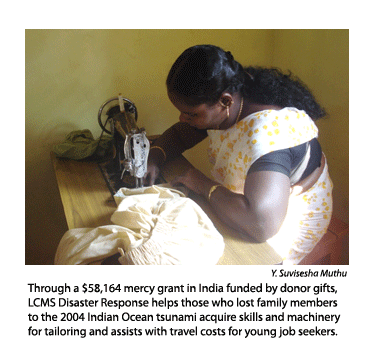By Pamela J. Nielsen
Nearly eight years after the devastating Indian Ocean tsunami claimed some 283,000 lives and countless livelihoods, LCMS Disaster Response continues to help those still affected by its deadly waves.
The Synod disaster arm’s help keeps coming in India through a $58,164 LCMS mercy grant funded by donor gifts. The grant covers job-training and equipment costs for widows of income providers lost to the tsunami and fees for drivers training and drivers licenses for young job-seekers from such families.
As the world watched in horror, the Dec. 26, 2004, Indian Ocean tsunami’s massive waves struck thousands of miles of Asian coastline, washing away just about everything and everyone in its path. Within hours of the earthquake that caused the tsunami, walls of water had slammed into the coastlines of 11 Indian Ocean countries, from east Africa to Thailand.
By the end of the day, it had killed 150,000 people, with the final death toll reported at 283,000.
Those left behind recovered very little from their previous lives. Family members, homes, possessions and places of employment were washed out to sea, leaving tens of thousands with broken dreams and broken lives.
Much of the world rushed in — relief organizations with millions of donated dollars — providing immediate, life-sustaining aid and deluging the affected areas with clothing, food, temporary shelter, medical aid and much more.
And almost as quickly, most of those aid organizations and their dollars left, having done what they came to do: provide immediate, physical relief in the face of disaster.
In sharp contrast, LCMS Disaster Response is still bearing mercy, providing aid and changing lives, all the while pointing people to the One who can save lives for eternity.
“The fact is, here we are nearly eight years later and we’re still responding, and we’re not even close to finishing up,” said Darin Storkson, LCMS regional director for Southern Asia and Oceania, as he spoke about the ongoing Tailoring Training project to help Indian widows and young people in need of employable skills.
“In this one place with this one pastor [from an LCMS partner, the India Evangelical Lutheran Church (IELC)], this is already the third program. And this particular program still has three phases to go … that will take another year or so,” Storkson said.
The project to provide 25 widows with sewing machines and training in tailoring means that these women can now earn a living. In addition, the project’s grant dollars covered the cost of drivers education and license fees for 25 young job seekers.
The impact of the $58,164 LCMS mercy grant — distributed through the IELC congregation in Nagercoil, which is near the project in the small community of Colachel in Kanyakumari District, Tamil Nadu, India — will be felt by more than 250 families, as these widows and young people receive financial support through gainful employment.
“Since Christians are a tiny minority in India, most of the recipients of this mercy work and aid are non-Christians; so that gives the pastor or church worker in that community an opportunity to build a relationship with them and gain their trust and respect,” said Storkson. “There [have] been any number of conversions and new members coming to our partner church through these programs, as we would expect and have hoped for.”
The Rev. Y. Suvisesha Muthu, an IELC pastor, is the project director. “Through this project,” he said, “we were able to share the love and mercy of Jesus Christ. Prayer meetings are being conducted every month and the Gospel is spread among the community.”
Storkson praised “Pastor Suvi for his excellent accountability and cooperation.”
Noting that the people of the LCMS gave generously to tsunami relief, Storkson explained, “We have about $665,000 left from the total $5,776,942 Indian Ocean Tsunami Relief dollars given by members of the LCMS. We are focusing our remaining efforts in India, walking alongside our strong partner in that place, the IELC.”
“The LCMS is different because we aren’t just about the aid; it’s not just about the physical. It’s about the spiritual, too, and that means it has to be a longer commitment,” Storkson said, adding a reminder that the LCMS approach to disaster relief is that it is “intentionally conducted in close proximity to Lutheran Word-and-sacrament [ministry].
“It’s important to communicate that we are still working eight years after the tsunami and will be working another five years,” Storkson emphasized. “We are in it for the long haul, to build relationships and build the capacity of our partners.”
Deaconess Pamela J. Nielsen is editor, Witness, Mercy, Life Together, for LCMS Communications.
Posted Aug. 29, 2012

